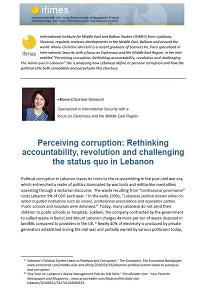Perceiving corruption: Rethinking accountability, revolution and challenging the status quo in Lebanon
Perceiving corruption: Rethinking accountability, revolution and challenging the status quo in Lebanon
Author(s): Marie-Christine Ghreichi
Subject(s): Politics, Governance, Economic policy, State/Government and Education, Health and medicine and law, Corruption - Transparency - Anti-Corruption
Published by: IFIMES Mednarodni inštitut za bližnjevzhodne in balkanske študije
Keywords: Lebanon; politics; corruption; accountability; economy;
Summary/Abstract: Political corruption in Lebanon traces its roots to the re-assembling in the post-civil war era, which entrenched a realm of politics dominated by war lords and militia-like mentalities operating through a sectarian discourse. The waste resulting from “confessional governance” costs Lebanon 9% of GDP each year. 1 In the early 1990s, “Lebanese political bosses either coopted or gutted institutions such as unions, professional associations and opposition parties. Public schools and hospitals were defunded.” Today, many Lebanese do not send their children to public schools or hospitals. Sukleen, the company contracted by the government to collect waste in Beirut and Mount Lebanon charges 4x more per ton of waste disposed in landfills compared to providers in the UK. 2 Nearly 40% of electricity is produced by private generators established during the civil war and partially owned by various politicians today, profiting close to $1 billion a year. Electricite du Liban, the public electricity company collects payments for only half of the power it produces.
Series: IFIMES Research Papers
- Page Count: 9
- Publication Year: 2020
- Language: English
- Content File-PDF

